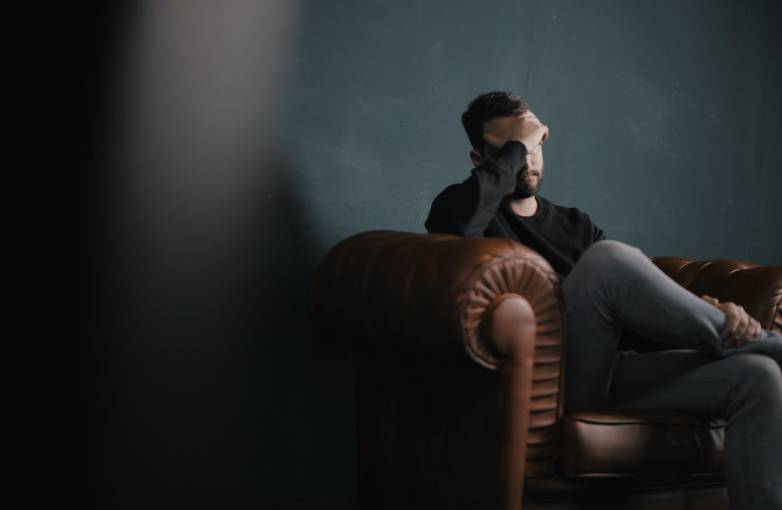Proudly Serving Veterans
with TriWest Insurance
We utilize the latest FDA-Approved TMS Therapy to treat Veterans. Call (619) 648-5350 Today!
TMS for Anxiety
TransCranial Magnetic Stimulation
Anxiety disorders are mental illnesses that can quickly become debilitating to their hosts. Not only this, but when it comes to the top-recognized co-occuring mental illnesses that exist alongside addictions, depression, bipolar disorder, eating disorders, and more, professionals in the psychiatric industry have found that anxiety disorders rear their ugly heads constantly.
Typical treatment “success recipes” prescribed for anxiety disorders include therapy (such as talk therapy, or CBT), psychotropic medications (including SSRIs), and other experiential activities. However, Transcranial Magnetic Stimulation (or “TMS” for short) has proven to be extremely useful when it comes to relieving individuals from the suffering that anxiety disorders can inevitably cause. Believe it or not, many people do not know about this relatively new technology when seeking treatment for their mental illness. While this treatment has been around for over a decade, it has only recently begun gaining momentum and recognition in mainstream depression and anxiety treatment plans.
What is TMS?
Transcranial Magnetic Stimulation was originally approved for the safe treatment of depression in 2008. However, in the past ten years, TMS has also been shown to improve anxiety amongst a myriad of other mental disorders- especially in cases where other means of anxiety and depression treatment have been exhausted. TMS uses magnetic energy pulses to improve the functions of the brain and the quality of mood for a considerable amount of time (and sometimes even permanently).
TMS is considered non-invasive and requires no surgery. For this reasons, it is an ideal pick for treatment-resistant anxiety. Not only this, but it also involves minimal side effects (with many people experiencing no post-treatment side effects whatsoever). Transcranial Magnetic Stimulation is not to be confused with Electroconvulsive therapy, which has a reputation for severe side effects and works by a completely different type of process
How Is TMS Conducted?
During the initial session of Transcranial Magnetic Stimulation, the administering professional will normally sit down with the first-time patient and describe what this practice will entail in order to ensure more familiarity for the veteran. It’s important that the one conducting the therapy is thorough in their explanation of what Transcranial Magnetic Stimulation will encompass. This way, the veteran can feel as comfortable as possible when embarking on this new journey.
After a careful and comprehensive explanation is carried out and all questions by the veteran are answered, a magnet (or magnets) are placed on specific areas of the scalp while the receiver becomes settled in a comfortable position. The magnet is used to deliver high-frequency pulses to the brain of the veteran. Usually, TMS sessions last anywhere from 30-40 minutes. Multiple clinical trials and research studies support the notion that TMS is highly effective in treating depression and anxiety.
What Types of Anxiety Disorders are There?
There are five main types of anxiety disorders that are widely recognized by mental health professionals and seen frequently in mental health treatment facilities. These five illnesses include:
- Generalized Anxiety Disorder (GAD): GAD is an anxiety disorder that consists of constant worrying and rumination, regardless of whether there is any solid, physical, or substantial issue to worry about. Generalized Anxiety Disorder can also cause muscle tension, difficulty concentrating, restlessness, fatigue, and irritability. For someone to be diagnosed with Generalized Anxiety Disorder, they should be suffering from these symptoms for at least six months on more days than not.
- Panic Disorder: Panic Disorder is an anxiety disorder that is mainly characterized by periods of intense or debilitating fear that are usually accompanied with other distressing physical and mental symptoms. Panic Disorder encompasses those who suffer from anxiety attacks and panic attacks. These attacks usually include (but are not limited to) shortness of breath, rapid heartbeat or heart palpitations, numb or “curling” hands and fingers, chest pain, and dizziness.
- Obsessive-Compulsive Disorder (OCD): This anxiety disorder is characterized by intrusive thoughts or “obsessions” that are followed by rituals or “compulsions” that are meant to protect the sufferer from the fearful obsessions that they’re experiencing. Obsessive compulsive disorder has multiple categories and isn’t just limited to being obsessed with germs and cleaning. OCD can also include Relationship OCD (ROCD), “Pure O”, and other sub-parts.
- Social Phobia (Social Anxiety Disorder): Social Anxiety involves being uncomfortable and overly self-conscious on a day-to-day basis in any social situation. Social Anxiety has the potential to get in the way of authentic connection for the sufferer and inhibit their ability to form deep bonds and relationships- something crucial to the socially-programed human species.
- Post-Traumatic Stress Disorder (PTSD): Post-Traumatic Stress Disorder is an anxiety disorder that develops after one is subjected to a traumatic event. Traumatic events are relative and are based solely on the interpretation of the individual sufferer, but can involve flashbacks, nightmares, amongst other very distressing symptoms.
Common Treatments For Anxiety
The first approaches to anxiety usually include therapies such as Cognitive Behavioral Therapy (CBT), Dialectical Behavioral Therapy, and exposure therapies. If these therapies alone are not enough to adequately relieve someone’s anxiety, SSRI (Selective Serotonin Reuptake Inhibitor) and SNRI (Serotonin and Norepinephrine Reuptake Inhibitor) medications are often prescribed. These medications alter the release of brain chemicals that are responsible for multiple mood disorders such as serotonin and dopamine. Often, medications don’t suffice, either. Or, they may come with adverse side-effects that can be just as bad as, or worse, than the anxiety itself. In these cases Transcranial Magnetic Stimulation can prove to be extremely beneficial.
Those who have experienced anxiety know firsthand how debilitating it can be to their way of life. The best approach to treating anxiety involves a well-rounded and comprehensive plan that features multiple types of treatments in order to address the illness from every possible angle. Transcranial Magnetic Stimulation also has the potential to help those suffering from anxiety reach a healthier and more livable state of mind. TMS should be deeply considered in the treatment plans for individuals with this mental illness.
Contact Us About TMS
For more information about TMS Treatment, fill out the form below!






